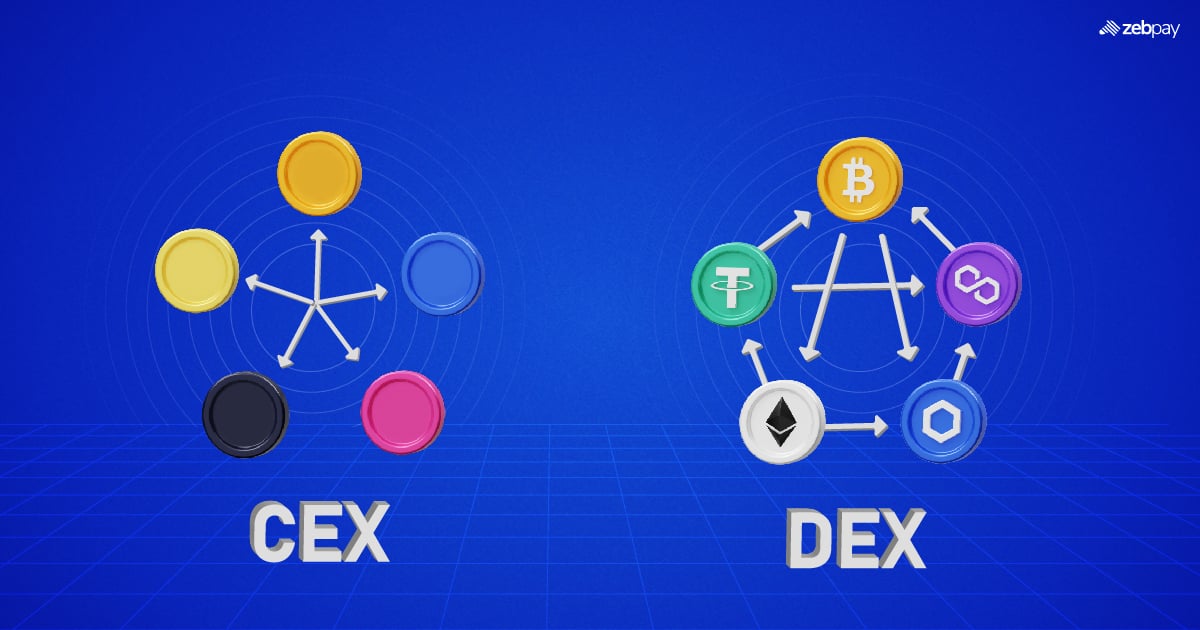Crypto trading is gaining popularity every day, with the possibility of high returns at the tip of your fingers. To get started, all you need is a crypto exchange to trade your funds. But with so many options in the market, how do you make the best choice? This article will break down the differences between centralised and decentralised crypto exchanges, so you can make the right choice for your needs.
What is a Centralized Exchange (CEX)?
A centralized exchange is a platform where all transactions are managed by a central authority, and users deposit their funds into the exchange’s centralised wallet. This type of exchange operates like a traditional stock exchange, where a third party manages the trades and keeps custody of the assets.
Advantages of CEX
One of the significant advantages of CEXs is their user-friendly interface, making them accessible even to new traders. Additionally, CEXs offer faster transaction times, higher liquidity and a wide range of trading pairs. These exchanges also have robust customer support, making them more accessible to beginners who might need help navigating the trading process.
Disadvantages of CEX
However, centralised exchanges also have few disadvantages. Firstly, CEXs are vulnerable to hacks and thefts since they hold users’ funds in a central location. Secondly, they are often subjected to strict regulations and government interventions, leading to potential downtime or restrictions.
What is a Decentralized Exchange (DEX)?
A decentralized exchange is a platform where users can trade crypto directly without the need for an intermediary or central authority. These exchanges are based on blockchain technology, enabling peer-to-peer transactions, and are often powered by smart contracts.
Advantages of DEX
One of the significant advantages of DEXs is their high level of security since user funds are not stored in a centralised location. They are instead distributed across the blockchain, making them more resilient to hacks and thefts. Additionally, DEXs offer users greater privacy since they do not require KYC checks or personal information to trade. Finally, DEXs are more decentralised and less susceptible to government interventions or shutdowns.
Disadvantages of DEX
However, DEXs are still relatively new and have several disadvantages. Firstly, they are not as user-friendly as CEXs, making them more challenging for beginners to use. Secondly, DEXs often have lower liquidity since they rely on users to provide liquidity through smart contracts. Finally, transaction times on DEXs can be slower, leading to potential delays and higher transaction fees.
CEX vs DEX: A Comparison

Here is a simple CEX vs DEX comparison that breaks down their main features.
| Factors | CEX | DEX |
| Centralization | Centralised | Decentralised |
| Privacy | KYC/AML required | Anonymous trading |
| Security | Centralised, more prone to hacks | Decentralised, less prone to hacks |
| Liquidity | High liquidity | Lower liquidity |
| Fees | Higher fees | Lower fees |
| Speed | Faster transaction times | Slower transaction times |
| User Experience | User-friendly interface | Complex. Requires interaction with smart contracts |
| Trading | Buying and selling facilitated by the exchange | Peer-to-peer trading |
| Regulatory Framework | Subject to regulation and licensing | Not always regulated or licensed |
CEX vs DEX for Security
CEXs are generally considered less secure than DEXs since they are centralised and hold users’ funds in a central location. CEXs are often targeted by hackers, leading to theft and losses for users. In contrast, DEXs offer greater security since they do not store user funds in a central location, reducing the risk of hacks and thefts. However, this is also subject to which centralised exchange we are taking into consideration. For example: ZebPay has state of the art security and has never been hacked till date. Our robust security systems keep customer assets safe at all times.
CEX vs DEX for Liquidity
CEXs offer higher liquidity since they have more trading pairs, making it easier to buy and sell crypto assets. Additionally, CEXs often offer margin trading, further increasing liquidity. DEXs, on the other hand, have lower liquidity since they rely on users to provide liquidity through smart contracts.
CEX vs DEX for Fees
CEXs often charge higher fees than DEXs, with fees ranging from 0.1% to 0.5% per trade. Additionally, CEXs may charge additional fees for depositing, withdrawing, or trading certain currencies. In contrast, DEXs often have lower fees, with some platforms offering zero trading fees, but they may charge network fees for transactions. In the CEX vs DEX for fees comparison, DEXs come out ahead.
CEX vs DEX for User Experience
CEXs are generally considered more user-friendly than DEXs since they have a simple and intuitive user interface. CEXs often offer a range of tools and features, making it easier for users to buy and sell crypto. DEXs, on the other hand, are more complex and require users to interact with smart contracts.
Which is Better: CEX or DEX?
The answer to this question depends on several factors, such as the user’s trading experience, preference for privacy, and security concerns. If you’re a new trader, a CEX might be a better option since it’s more user-friendly and offers higher liquidity.
Another factor to consider is transaction fees, where DEXs often have lower fees than CEXs. However, this is not always the case, and some DEXs might have higher network fees, making it more expensive to trade crypto.
Finally, when it comes to speed and transaction times, CEXs are generally faster than DEXs. This is because CEXs have a centralised system, which enables faster transactions, while DEXs are decentralized, which can result in slower transaction times.
Read more: Crypto Trading Strategies
Conclusion: Choosing the Right Exchange
In conclusion, choosing between a CEX or a DEX depends on your trading needs and preferences. If you’re a new trader, a CEX might be a better option due to its ease of use and higher liquidity. However, if you’re concerned about privacy, a DEX might be a better option since it’s more decentralized and offers greater privacy.
It’s essential to consider the factors discussed in this article, such as security, liquidity, fees, user experience, and speed when choosing an exchange. Ultimately, you should choose an exchange that best suits your trading needs and provides the necessary features and tools for a seamless trading experience.
You can read more about Web 3.0, What is DEX and blockchain on ZebPay blogs. Join the millions already using ZebPay Singapore.
FAQs on CEX vs DEX
What Is The Difference Between A Cex And A Dex?
A CEX is centralised, which means that it is controlled by a central authority that manages the exchange’s operations. In contrast, a DEX is decentralized, operating on a decentralized platform that does not rely on a central authority.
What are Some of the Best CEX and DEX Platforms?
Some of the best CEX platforms are Coinbase, Binance and ZebPay, while some popular DEX platforms include Uniswap, PancakeSwap and SushiSwap. It’s important to do your research and compare different exchanges before choosing one to trade on.
Do I Need To Provide Personal Information To Trade On A Dex?
No, DEXs often allow users to trade anonymously without the need for KYC or AML checks. This is because they are decentralized and do not require a central authority to manage user accounts.
Which is better for a new trader, a CEX or a DEX?
CEXs are generally considered more user-friendly than DEXs, making them a better option for new traders. Additionally, CEXs often have higher liquidity, making it easier for traders to buy or sell crypto tokens.







